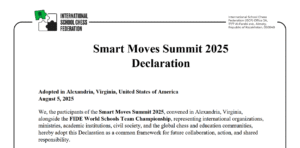
September 22, 2025
The release of the “Smart Moves Summit 2025 Declaration” on August 5, 2025, marks a pivotal moment for the global Chess in Education (CIE) movement. Adopted in Alexandria, Virginia, this declaration represents a powerful, unified call to action, urging educational systems worldwide to recognize and integrate chess as a proven tool for student development. For the United States, which has historically trailed other nations in CIE adoption, this global framework arrives at a timely juncture, offering both a blueprint for action and a significant opportunity for collaboration.
When viewed through the lens of Chess in Education – US’s “Scaling Up CIE in the US 2024” report, the Declaration is not merely an aspirational document but a strategic catalyst that can help unify the fragmented American CIE landscape and accelerate its progress.
The Global Vision of the Declaration
Convened by the new International School Chess Federation (ISCF) alongside the FIDE World Schools Team Championship, the Smart Moves Summit brought together a diverse group of stakeholders, including ministries, academic institutions, and leaders from the global chess and education communities. The resulting Declaration is built on several core principles:
- A Call to Action for Educational Systems: It urges ministries of education to integrate chess into formal and informal learning environments, supported by teacher training and evidence-based curricula.
- Promoting Equity and Inclusion: It commits to expanding access for underserved, neurodiverse, and disabled students, while also addressing gender disparities.
- Embracing Innovation: It encourages the responsible use of technology, including digital platforms and generative AI, to create personalized and engaging learning experiences.
- Strengthening Global Collaboration: It calls for cross-border cooperation, joint research, and partnerships to fund scalable initiatives, aligning with the UN’s Sustainable Development Goal for Quality Education.
- Advancing Research and Evidence: It advocates for rigorous research on the cognitive, academic, and social-emotional impact of chess to inform policy and program design.
To facilitate these goals, the Declaration proposes a Global Exchange Platform, convened by the ISCF, to serve as a low-barrier, nonbinding hub for sharing best practices and fostering dialogue among international partners.

Read the full Smart Moves Summit 2025 Declaration
The American Context: Fragmentation and Opportunity
The “Scaling Up CIE in the US” report meticulously documents the challenges that have hindered widespread CIE adoption in America. Unlike nations with centralized education ministries, the U.S. system is highly decentralized, forcing CIE advocates to market their programs to thousands of individual school districts. This fragmentation is compounded by political controversies, debates over funding, and the historical focus of national chess federations, like US Chess, almost exclusively on competitive chess rather than educational applications.
This is precisely where the Declaration’s significance for the U.S. becomes clear. The report identifies that while all the necessary elements for a thriving CIE ecosystem exist in the U.S.—leaders, donors, curricula, and infrastructure—they are disconnected. No single organization has the resources or reach to lead a national effort alone. The proposed solution is a concerted, collaborative effort among the key stakeholders in the US chess community.
The arrival of a well-funded, FIDE-affiliated international organization like the ISCF, with a mission to unite national school chess associations, provides a powerful external catalyst for such collaboration. The challenge for CIE advocates in the U.S. is to prepare for participation in this global effort. The Declaration itself provides the common framework around which U.S. organizations can align and coordinate their efforts.
Bridging the Gap: Reconciling Educational and Competitive Chess
A central theme in both the “Scaling Up” report and the broader CIE discourse is the critical distinction between educational chess and competitive chess. Educational chess, ideally delivered by classroom teachers during school hours, uses the game as a tool to teach transversal skills like critical thinking, emotional regulation, and problem-solving. Competitive chess, often found in after-school clubs, treats mastery of the game as the primary goal.
The Declaration strongly supports the educational model by emphasizing goals like metacognition, social-emotional development, and equity—priorities that align directly with the needs of educators. This reinforces a key strategy from the “Scaling Up” report: adopting a “pull marketing” approach. Instead of “pushing” chess on schools by highlighting tournament victories, advocates must present chess as a solution to educators’ existing challenges. By focusing on student development for all, not just future champions, CIE programs can gain the trust and buy-in necessary for sustainable, scalable implementation. A balanced model, where educational chess is offered in the classroom and competitive clubs are an optional after-school activity, can satisfy both goals and serve all students.
The Path Forward: A Call for American Collaboration

The Declaration, backed by the formidable resources and global scope of the ISCF, presents an unprecedented opportunity for the U.S. CIE community. The ISCF’s mission to unite national school chess associations and support the global integration of chess into school curricula is a powerful force. Consequently, it is one that the U.S. can and should engage with.
Recent collaborative successes, like the 2024 Saint Louis Chess Conference, demonstrate that key U.S. stakeholders—including the Saint Louis Chess Club, US Chess, and the Kasparov Chess Foundation—are increasingly recognizing the value of working together. A SWOT analysis in the “Scaling Up” report highlights how these different organizations bring unique strengths from financial resources and event planning to professional development and international leadership. By combining these capabilities, the U.S. can overcome its fragmentation and build a unified front. These successes build upon the nascent vision of the CIE Coalition which led to the founding of the chessineducation.org website in 2020 and deepened ties with the international Chess in Education community.
The Smart Moves Summit 2025 Declaration is more than an international statement; it is a powerful tailwind for the American CIE movement. It validates the educational-first approach, provides a platform for global knowledge sharing, and creates an urgent and compelling reason for U.S. stakeholders to finally unite. The framework for collaboration has been laid out; the international partners are preparing for the future. It is now up to the leaders within the U.S. to set aside their individual priorities and answer this call to action.
Even if ISCF is unable to fulfill its vision for global collaboration (and we hope they do), the fact remains that in the U.S. – as in many other countries – collaboration between organizations will be critical for developing scalable and sustainable initiatives.
–
 Author: Neil Dietsch, Managing Director, Chess in Education – US
Author: Neil Dietsch, Managing Director, Chess in Education – US
After earning an MBA at the University of Michigan, Neil Dietsch’s professional career included information technology consulting, management, and senior project management positions in dozens of Fortune 500 companies. He served as president of the Alabama Chess Federation from 2010 to 2019. In 2016 he co-founded, with Jerry Nash, the educational charity Chess in Schools – which became Chess in Education – US in 2023.
This article includes a mix of original and GenAI content validated by the author.
